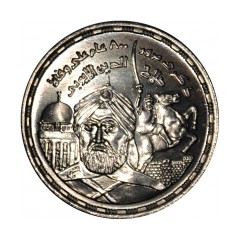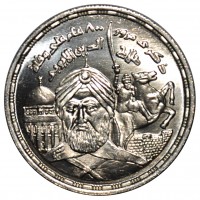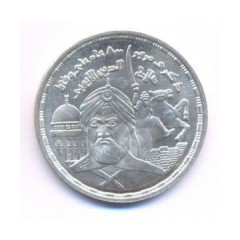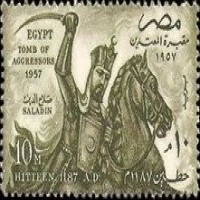الملك الناصر أبو المظفر صلاح الدين والدنيا يوسف بن أيوب بن شاذي بن مروان بن يعقوب الدُويني التكريتي (532 - 589 هـ / 1138 - 1193 م)، المشهور بلقب صلاح الدين الأيوبي قائد عسكري أسس الدولة الأيوبية التي وحدت مصر والشام والحجاز وتهامة واليمن في ظل الراية العباسية، بعد أن قضى على الخلافة الفاطمية التي استمرت 262 سنة. قاد صلاح الدين عدّة حملات ومعارك ضد الفرنجة وغيرهم من الصليبيين الأوروبيين في سبيل استعادة الأراضي المقدسة التي كان الصليبيون قد استولوا عليها في أواخر القرن الحادي عشر، وقد تمكن في نهاية المطاف من استعادة معظم أراضي فلسطين ولبنان بما فيها مدينة القدس، بعد أن هزم جيش بيت المقدس هزيمة منكرة في معركة حطين.
كان صلاح الدين يقول بمذهب أهل السنة والجماعة،وروي أن عبد القادر الجيلاني دعا له عندما رآه بالبركة فيه، خلال "زيارة خفية" لنجم الدين أيوب وأسرته بغداد سنة 533 هـ/1138م،وهذا يفسر أتباعه الطريقة القادرية فيما بعدوبعض العلماء كالمقريزي، وبعض المؤرخين المتأخرين قالوا: إنه كان أشعريًا، وإنه كان يصحب علماء الصوفية الأشاعرة لأخذ الرأي والمشورة، وأظهر العقيدة الأشعرية. يشتهر صلاح الدين بتسامحه ومعاملته الإنسانية لأعدائه، لذا فهو من أكثر الأشخاص تقديرًا واحترامًا في العالمين الشرقي الإسلامي والأوروبي المسيحي، حيث كتب المؤرخون الصليبيون عن بسالته في عدد من المواقف، أبرزها عند حصاره لقلعة الكرك في مؤاب، وكنتيجة لهذا حظي صلاح الدين باحترام خصومه لا سيما ملك إنگلترا ريتشارد الأول "قلب الأسد"، وبدلاً من أن يتحول لشخص مكروه في أوروبا الغربية، استحال رمزًا من رموز الفروسية والشجاعة، وورد ذكره في عدد من القصص والأشعار الإنگليزية والفرنسية العائدة لتلك الحقبة.









